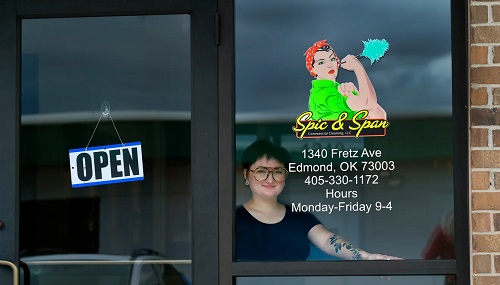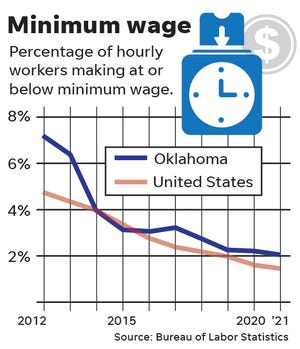
9.7.22 – The Oklahoman
In the 13 years since Congress last touched the federal minimum wage, employers have been forced to compete with one another, offering higher and higher pay to keep employees on the payroll.
This has led to higher wages across the board, including at Edmond-based Spic & Span Commercial Cleaning, a company that provides cleaning services for government and commercial buildings. Danielle Graham, who works in the office managing operations for Spic & Span, said the $7.25-an-hour minimum wage just isn’t enough to pay the bills.
“You can’t even survive on that. You can’t buy groceries. You can’t buy good food. You can’t take care of your car,” Graham said. “It’s not enough just to have the lights on anymore.”
The owner of Spic & Span, Annette Sigle, recognizes how important it is to offer wages that not only compete with other employers, but ensure her employees like Graham make enough money to thrive.
“If you want somebody really good, if you want somebody to show up every single day to their job and to do a good job, you have to pay him right. Minimum wage is a thing of the past,” Sigle said. “You can’t even get school kids to work for that.”
Minimum wage jobs in Oklahoma are exceedingly rare and nearly impossible to find through public listings and staffing agencies.
As of 2021, the federal Bureau of Labor Statistics estimates that only 18,000 Oklahomans made at or below minimum wage and represent less than 2% of the state’s hourly workforce. Nationally, 1.4% of hourly workers make minimum wage or below.
The dramatic falloff in Oklahoma from 64,000 workers a decade ago highlights the shrinking pool of workers who are willing or able to keep a full-time job that pays so little. Even the COVID-19 pandemic, which drove hourly wages and benefits higher in service industry and other relatively low-pay jobs, did little to affect the already low number of people making minimum wage.
“Nobody is working for $7.25. The absolute minimum for over a couple of years has been nine bucks, and now is closer to $12,” said Harvey Harris, an Oklahoma City branch manager for Labor Finders, a staffing and temp agency.
The trend of rising wages could be affected by the overall job market, with a balance struck between the number of jobs available and the amount of people who are looking for one. According to the Bureau of Labor Statistics, Oklahoma’s unemployment rate ticked up to 3% in July after a historic low of 2.6% earlier this year.
That rate make Oklahoma tied for 20th among other states. The Oklahoma City metropolitan area unemployment rate is 3.2%, tied for 109th.
Nationally, the unemployment rate fell to 3.5% for the first time since the COVID-19 pandemic began in early 2020. Unemployment claims across the country fell slightly, according to the most recent week of data.
The search for $7.25 an hour

If you can find job listings that begin at $7.25 an hour, the position likely includes tips or sales bonuses, or is only a part-time job.
“I’d be shocked if anybody was really paid $7.25,” Harris said. “It’s a dinosaur.”
The Bureau of Labor Statistics reported there were about 155,000 workers in the state earning at or below $9.92 per hour last year. That’s still just 17% of hourly wage earners.
“To get anybody to work for $13, or under $13, is highly unlikely,” said Scott Delgado, with Paydayz Staffing Solutions. “You’re talking about people with backgrounds and things like that, and are having trouble passing drug screenings.”
By his estimate, it’s been a decade since minimum wage jobs were common in the workforce.
Jobs that are traditionally thought of as entry-level, low-wage positions often sit well above the minimum wage. A McDonald’s in Oklahoma City advertised a “guest experience leader” position for $11.25 an hour.
Big box retailer Target has set its own minimum starting wage at $15. A Walmart in Edmond is hiring retail associates at $12 an hour.
Graham said that earning a living wage at Spic & Span gives her peace of mind.
“If I get sick and I need to take a leave, I can do that. And I’m not going to have to stress and wonder who’s going to pay my medical bills and everything like that,” she said. “Yeah, I feel very fortunate to have a job where I feel so secure.”
Sigle gives her employees bonuses and has given two across-the-board raises since December.
“I’m a firm believer that you have to take care of your employees, and so they’ll take care of you,” Sigle said.
Staff writer Dale Denwalt covers Oklahoma’s economy and business news for The Oklahoman. Have a story idea for Dale? He can be reached at ddenwalt@oklahoman.com or on Twitter at @denwalt. Support Dale’s work and that of other Oklahoman journalists by purchasing a digital subscription today at subscribe.oklahoman.com.
